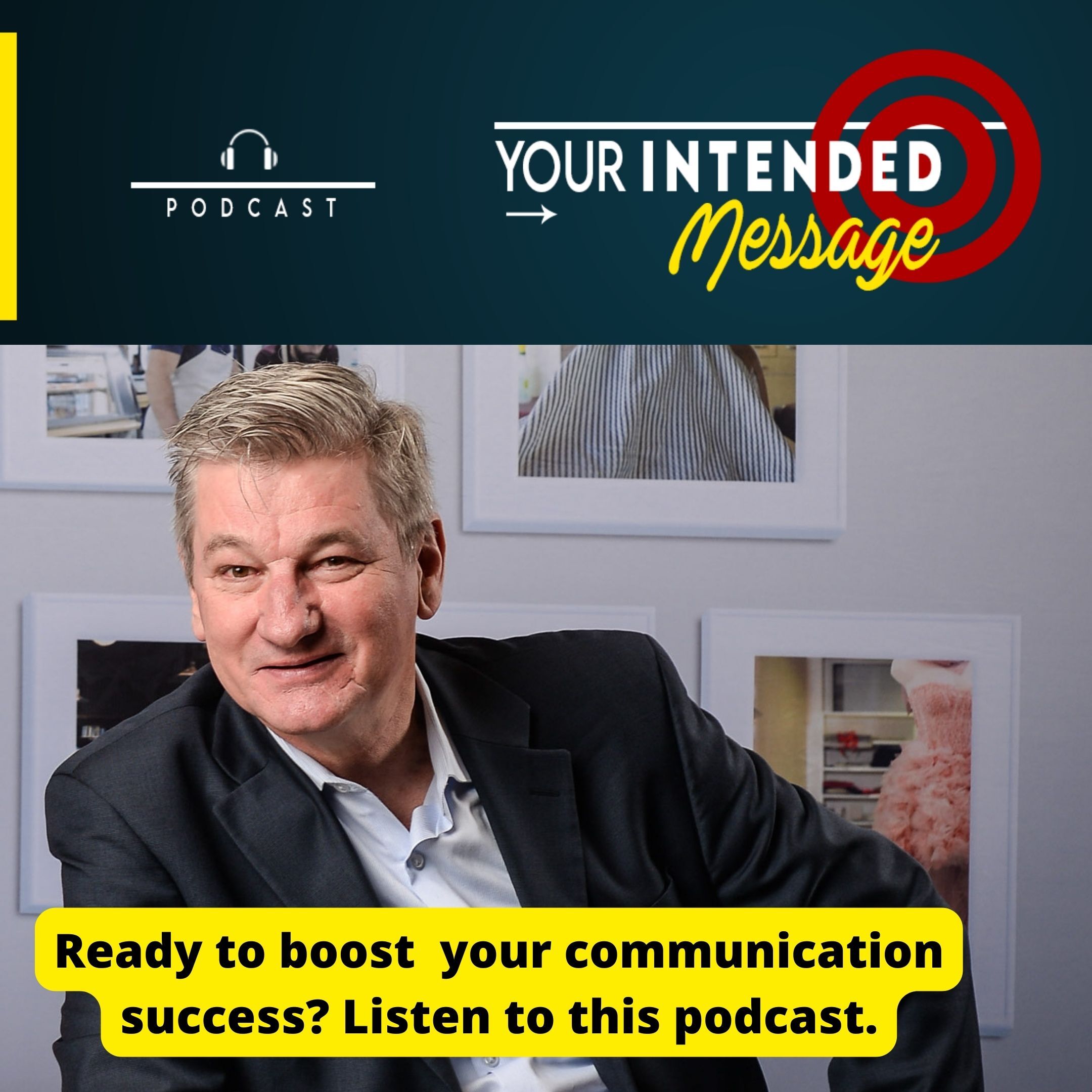
17.9K
Downloads
294
Episodes
The podcast about Effective Communication in Business
Better communication skills will advance your career and business. Are you ready to enhance your understanding and results from better communication? Listen and learn how to deliver Your Intended Message.
Are you willing to cross-examine communication from various perspectives? Would you like to deliver your intended message more effectively?
Listen to Your Intended Message to gain a powerful advantage in your ability to convey your message to your audience, team, clients or marketplace.
Learn from the mistakes and success of communication experts from around the world from different scenarios.
The better communicator has the competitive advantage.
Imagine what that means to you when you improve the success of your next conversation, presentation or message.
Your Host - George Torok
https://yourintendedmessage.com/
The podcast about Effective Communication in Business
Better communication skills will advance your career and business. Are you ready to enhance your understanding and results from better communication? Listen and learn how to deliver Your Intended Message.
Are you willing to cross-examine communication from various perspectives? Would you like to deliver your intended message more effectively?
Listen to Your Intended Message to gain a powerful advantage in your ability to convey your message to your audience, team, clients or marketplace.
Learn from the mistakes and success of communication experts from around the world from different scenarios.
The better communicator has the competitive advantage.
Imagine what that means to you when you improve the success of your next conversation, presentation or message.
Your Host - George Torok
Episodes

Thursday Feb 15, 2024
Your Linkedin Profile Might be Hurting You: Donna Serdula
Thursday Feb 15, 2024
Thursday Feb 15, 2024
What does your Linkedin profile say about you and your organization?
Using Linkedin to project your personal brand
Episode 194 (Donna is based in Pennsylvania)
In this conversation with Donna Serdula we explore:
- What can executive leader gain from enhancing their Linkedin Profile
- Why Linkedin is more than a job board
- Why leaders should help their employees enhance their profiles
- How to clarify the purpose of your Linkedin presence
- Is your profile current or ancient history?
- Who are you and what do you stand for?
- Why your profile must not look like a resume even if you are searching
- Why the company might help their staff look better on Linkedin
About our guest Donna Serdula:
Donna wrote a "For Dummies" book on the topic of Linkedin profiles. She started her business in 2009 and has since branded over 8,000 executives, entrepreneurs and professionals on Linkedin and beyond.
Review and upgrade your Linkedin profile by visiting
https://www.linkedin-makeover.com/order-today/
-----
Excerpts from this conversation with Donna Serdula:
The LinkedIn profile, it's not the resume. It's a digital introduction. It's a first impression, it is your manifesto.
-----
If you want to be a thought leader, if you really want to dominate the platform, you want to post more than less, but at the same time, you can truly engage with your network and get seen by posting once a week.
It's not so much the quantity as much as it's the quality.
-----
LinkedIn wants fresh profiles showing up active people, people who have something to say. So by making sure that your profile is up to date, it would be more apt to show up in the search results, versus one that hasn't been touched in six months, right.
When you think of it like that, it makes sense. Keep your profile fresh, you're going to do better in search results.
-----
How do you decide when you connect versus simply let them follow?
Oh, that's a great question because there is a difference right? connection versus a Follow Follow is one one way street. It's you saying, hey, I want to subscribe to that person's updates.
Whereas when you connect, it's saying, Hey, I know this person, I like I trust this person. And not only am I subscribing to them, but they're going to subscribe to me, and they're going to be in my network, they're grew to become first degree connections, and all of their connections are going to become second degree connections, and all of those connections, connections are going to become third degree connections.
So it really does extend your reach when you connect, when that's a good thing.
-----
Read the rest of this entry »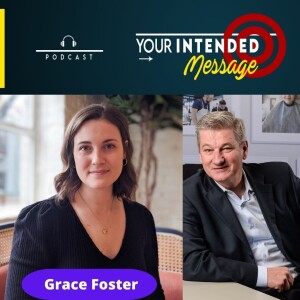
Thursday Feb 08, 2024
Don't send that email yet: Grace Foster
Thursday Feb 08, 2024
Thursday Feb 08, 2024
How to write smarter emails
Writing is a learned skill
Episode 193 (Grace is based in Washington DC)
In this conversation with Grace Foster we explore:
- Why we need to learn how to write smarter emails
- The danger of emotional writing
- Checking your writing for tone
- Consider the New York Times test
- Recognizing our negative bias
- Why you don't want to "bury the lead"
- How to kick start the writing process
- Recognizing the difference between the terrible drafts and final edit
About our guest:
Grace Aldridge Foster is co-founder of Bold Type, a WBENC certified 100% women owned company that trains people how to write more effectively in the workplace.
Learn more about her company and services here
Get the free guide to remove clutter from your writing
https://www.boldtype.us/clutterbust
-----
Excerpts from this conversation with Grace Foster:
Your writing speaks for you when you're not in the room. So you have to work harder to make sure that that your message is being received the way you intended it, because you aren't there to walk it back or to course correct.
-----
George, where do I start? I'll first say that I have a lot of sympathy for people writing emails, because we're all expected to do it. We write emails all day, every day, they are the cornerstone of workplace communication.
And yet no one actually has been taught how to write good emails, what happens is we just get into the workplace, and we start observing how other people do it. And we start emulating them.
Well, what happens if everyone who's already there is already writing terrible emails, you never sort of had a chance, right? So I just want to say there are a lot of people out there who are very smart, and actually very good writers, but who still write terrible emails.
And mostly it's because they've never been taught to do better. Things that I noticed are, of course, terrible subject lines, mostly people actually include subject lines these days, thankfully, gone are the days of kind of empty subject lines, because their spam filters, you know, latch on to those completely.
But a lot of times, folks are just way too vague in their subject lines. And I think one of the reasons for that is people forget one of the primary purposes of sending an email versus something else picking up the phone and calling for example, is that you have a record, your inbox is an archive, you can search your inbox looking for a particular conversation or message from someone.
But when you have a very vague subject line, it gets much more difficult to search for a particular email or particular conversation that you had previously. So it's not just that they're vague, which is a problem the first time you receive them that it becomes a problem also, if you want to find that email again later.
So that is certainly a common problem that I see. There. Also, too long. Emails are too long. They are too wordy. They're either too formal or not formal enough, right. The level of formality often doesn't fit the audience and the purpose of a particular message.
And something that we may talk about is that the frustration that I hear over and over from managers who engage in bold type to do email training is why don't my employees just know how to do it right. It's a judgement call.
All it's a judgement issue, you know, why don't they just understand why don't they just get that that email of a sent wasn't right. But that's a difficult thing to learn, it takes time.
-----
You should email like, your messages might end up on the front page of The New York Times because it's happened.
-----
Read the rest of this entry »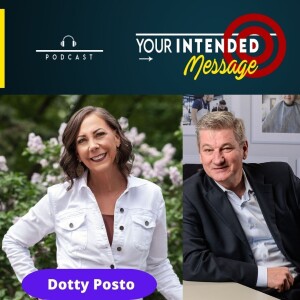
Friday Feb 02, 2024
How to address the Toxic Rock Star: Dotty Posto
Friday Feb 02, 2024
Friday Feb 02, 2024
Help the toxic star and save your team
"Does not play well with others"
Episode 192 (Dotty is based in Milwaukee)
In this conversation with Dotty Posto we explore:
- Why do some leaders get mean, and degrading?
- How to address this challenge with promising leaders
- Identifying the anger and frustration and how to redirect it
- Can we save this toxic person to become a true team supporter
- The process of diagnosing and correcting destructive behavior
- Looking for the balance in their life
About our guest Dotty Posto:
Dotty Posto helps CEOs and Senior Leaders ignite their stagnant culture to inspire their people to outstanding performance.
Dotty began her coaching and consulting business after working in Organizational Development for Fortune 500 companies such as The Chicago Tribune, Aon-Hewitt and Harley-Davidson Motor Company.
Dotty’s clients say, through their work with her, they’ve experienced new levels creativity, effectiveness, and well-being...without the struggle they'd become accustomed to.
Learn more about Dotty and her services at her website
You can find a free Energy Assessment and the free videos for Leadership Development
-----
Excerpts from this conversation with Dotty Posto:
I've seen leaders really get mean, I've seen leaders get judgmental and degrading, and to me that has no place in the workplace.
-----
And that's what's making that action, whatever action is causing the "does not play well with others" on my report card.
Some people call it a personality conflict, which I do not like that term. It is,, we are in such a brain state of reactivity, that something happens out there that we've seen or heard or experienced before, and it's triggering us and our amygdala is saying that our brain is saying you're not safe.
And it goes into fight, flight or freeze or there's also tend-to. befriend or fawn-on that some women do.
A woman might go into people pleasing, might go into, oh, everything's great, everything's fine. And, and never challenge anyone, or someone might be in the fight, and really go into challenging others and, and being very defensive and angry and upset, and, and so there's these two sides of the spectrum that people can react to when they have those triggers.
And it's creating what I work with people to do is create that space of choice to be able to first realize that it isn't what's out there.
It's got nothing to do with what's out there. It's what's happening in here. And in here, what's going on in our body? What's going on with that anger, that frustration? And what are the thoughts that are sending me there from an anger, frustration perspective?
-----
I think there's a few things. When I first started working at Harley, one of my managers gave me three leadership principles.
And one of them was get curious. Before you get furious, I am a huge proponent of providing feedback. And if they see an escalating situation, it might even be get curious, ask a question.
Say, Hey, you seem to be getting upset. What's happening that's creating this frustration, help us understand why you're getting frustrated here.
-----
Read the rest of this entry »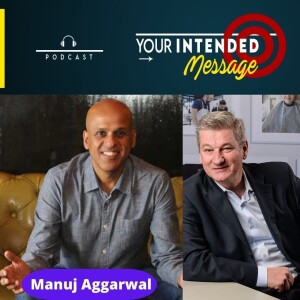
Thursday Jan 25, 2024
The Human Side of AI: Manuj Aggarwal
Thursday Jan 25, 2024
Thursday Jan 25, 2024
Is your business ready for AI? Are you?
Frankenstein technology or loyal servant?
Episode 191 (Manuj is based in Vancouver BC)
In this conversation with Manuj Aggarwal we explore:
- The promise and threat of Artificial Intelligence
- The possible impact of AI on your business success
- How AI can improve healthcare
- How to teach music to millions of students
- How you are already using AI almost every day
- And much more
About our guest Manuj Aggarawal:
He started as a $2/day factory worker. Now he is a global thought leader in Startups and AI who speaks in the boardrooms of Fortune 500 companies.
President Obama and Bill Gates have praised his education technology.
You can follow or connect with him on Linkedin
https://www.linkedin.com/in/manujaggarwal/
-----
Excerpts from this conversation with Manuj Aggarwal:
Whatever AI learns it is based on the data that humans produce through their real actions in the world. AI then uses that data and says, Oh, okay, this is how humans behave.
So let me help them produce more data. So you know, it's a circle that we are in where technology and humans interact with each other to produce more and more data.
-----
And the idea here, again, is lthe repetitive tasks, which we have come to know as our job that can be offloaded to AI.
But what that will produce is more time for us to focus on more creative efforts, more efforts where we can really understand human needs for what people are looking for.
I was talking to a neurosurgeon, and they said that 80% of their time goes into administrative work, like entering data about the patient and things of that nature.
They imagine all that overhead is offloaded to AI, that will free up so much more time for the neuroscientists and physicians to focus on their patients.
-----
We are working with a corporation, where they are trying to manage a lot of complex infrastructure that they have deployed in the field. And in order to manage all that people are spending like 20 hours a week, in meetings, and spreadsheets and emails.
And that's not very good for productivity. So with automation, and the AI, we can bring it down to maybe a couple of hours of meeting a week, and you know, free up all that time for more growth oriented activities for the company.
-----
So we really need to start thinking about how AI can solve some real problems, which tend to fall in three categories, save some time, help us save some money, or find areas to make more money.
That's the definition of becoming more productive. Right now. We are not thinking deep enough. We are just trying to automate the existing flows that we have in our life. Of course, it will save money, but sometimes you also need to think whether we even need to do this step. And can we just eliminate it altogether
------
Read the rest of this entry »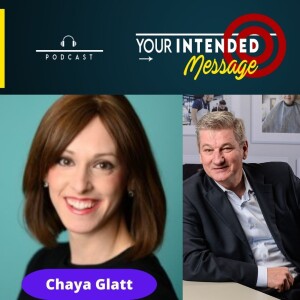
Friday Jan 19, 2024
Connect with your Customer: Chaya Glatt
Friday Jan 19, 2024
Friday Jan 19, 2024
Enter the mind of your prospects
Create and convey a stronger Brand message
Episode 190 (Chaya is based in New Jersey)
In this conversation with Chaya Glatt we explore:
- How to charge more for your services
- Why do we need to discover our brand DNA?
- What makes up our brand DNA?
- Convince with words or the images for impact
- Your thought process in creating an effective message
- How to target the right customer
- How to prove your claims of excellence
About out guest Chaya Glatt:
Chaya Glatt is a brand strategist, business name specialist and copywriter who helps high-performing businesses transform into big-league brands.
She's the creator of the MAD brand strategy formula and developer of Brand Authority, a training program for marketing creatives.
Review the online courses and free resources to boost your brand marketing...
https://chayaglatt.thrivecart.com/chaya-glatts-courses-and-guides/
-----
Excerpts from this conversation with Chaya Glatt:
The MAD formula - Market, Audience, DNA
When we talk about market, that's your competitors. What's already out there, what everybody else is already doing, then they're done that the audience is your audience who you're trying to sell to the DNA is who you are as a brand.
What makes you awesome, the areas where you've innovated the team that you've put together, that is sometimes one of your biggest uniques. So we dig down into all those things, and that's your brand DNA.
-----
Like the name of your podcast, your intended message is to tell the customer, why they should buy from you.
And when the customer hears, we've been around for 25 years, we have good service, we have a guarantee.
Those things are, one, something we hear from everybody else as well. It's very rare that a message like that is truly unique.
And two, those things are hard to believe they're not persuasive. Right? So you've been around for 25 years. So what maybe you've been doing a terrible job for 25 years. So why should I care?
We have good service, what does that even mean? Right? I want to know how that's going to change my life, how that's going to make a difference how that's going to solve a problem for me.
And the guarantee, okay, but I don't even care about your guarantee, because I don't know you, if I want your product. Once I know I want your product. If I hear there's a guarantee. That's cool.
That's the icing on the cake. Awesome, I have no reason to say no. But it doesn't make a difference to me yet, if I don't know that I want your product. And I think that's really like one of the biggest mistakes that brands may is just thinking that they can say whatever they want, and it doesn't need to really be met very meaningful at all.
And somehow their customer is going to get it that they are an industry leader that they are truly experienced, they are not going to get it because you haven't said anything meaningful to them.
-----
Read the rest of this entry »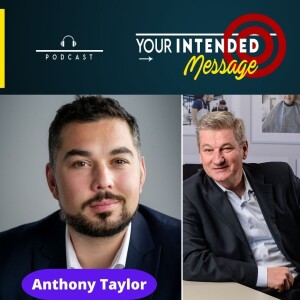
Thursday Jan 11, 2024
Facilitate a Productive Strategy Meeting: Anthony Taylor
Thursday Jan 11, 2024
Thursday Jan 11, 2024
Align your team, strategy and actions
How to get your team on the same page
Episode 189 (Anthony is based in Vancouver, BC)
In this conversation with Anthony Taylor we explore:
- The challenge and process of aligning the elements of the strategic plan
- The importance of focusing on one destination
- How to think of the organization first and your department second
- Why culture is central to strategy
- How long should your strategic plan be?
- The necessary questions around priorities and resources
- The relevance of vision, mission and values
- The importance of clarifying your intended message to your team
- How many pages should your strategic plan be?
About our guest Anthony Taylor:
Anthony is the CEO of SEM Strategy, which facilitates strategic planning for SME companies and non-profits.
Learn more about Anthony and the services of his company here

-----
Excerpts from this conversation with Anthony Taylor:
Anthony, as we prepare to wrap up, if you could sit down with a business leader, who's planning to have a how redoing type meeting, you know, let's review. We put together the strategy last year, and it's time for him to get him or her to get together with their team.
And if you could give them one, two or three pieces of advice going into this meeting to make this meeting more effective checking in, how are we doing? What, one, two or three pieces of advice would you offer?
Just before I do, I just want to say thank you for having me on that your intended message podcast. It's been super fun. I love this conversation.
And so for leaders that are about to get into how we're doing meeting, and a couple kind of best practices, I think one is focus on creating a safe space with your team.
Okay, and when we say safe, you know, we can't say necessarily psychological safe, we tried to talk about accountable, but really have the intention clear, you know, we're trying to focus on the process versus the people.
So if you can kind of separate the individuals from the outcomes and just say, hey, the purpose is to look at the outcome. And I'll give you the agenda is what did we do well, and what didn't we do well, and focus not on who did it or who didn't do it.
Look, as a company, you'll have everybody more willing to discuss criticism and challenges and that kind of thing. So focus on process versus people. Number two, is create the framework for like, why are we doing this? You know, we're doing this review, so that we can move forward to that next level.
And so if everybody is clear about what the next level is, then they'll recognize kind of what's at stake for doing the review. And the way that I say it a different way or way to reframe it is the work that we put in is a function of our goals.
If we have small goals, it'll be Don't we have to do less work for it. It's less challenging. So if we have big ambitious goals, then we need to do big ambitious work to get there. So it kind of helps you overcome those challenges. So one process and people to have something big at stake. And if there's a third one, just make it fun. team's got to be out, you know, sometimes it's stressful.
They have to be out of work. It's psychologically heavy work. You know, just make it enjoyable. Say, Hey, we love our jobs. We'd like to work we do, hopefully, like your job. And saying, like, Let's just enjoy today. It doesn't need to be doom and gloom. Let's take the opportunity to celebrate all of the good things that happened in the year.
And then you'll say, Wow, we actually accomplished more than we thought. Most people just focus on the negative versus looking at like, hey, the only reason we have as much negative bad stuff as much stuff we didn't do is because we did so much they built the next level that's more challenging.
That's just levels. So if you can get your team doing that, and focus on continually improving, focusing on the process and having something bigger at stake, you'll have a great meeting, and your team will be even more aligned than before.
-----
Read the rest of this entry »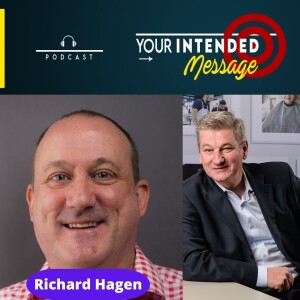
Thursday Jan 04, 2024
Leadership Lessons from a former Preacher :Richard Hagen
Thursday Jan 04, 2024
Thursday Jan 04, 2024
What can business leaders learn from religion and preaching?
Model organization culture by studying religion
Episode 188 (Richard is based in Glasgow UK)
In this conversation with Richard Hagen we explore:
- How to tell an old story in a more compelling way
- How to craft a disruptive message to change the relevance
- How to place your audience on wobble boards when you start
- The difference between a gimmick and truly being disruptive
- How leaders can connect with their audience through empathy
- How to expose the controversy to grab their attention
- Why emotional connection must precede information
About our guest Richard Hagen:
Richard severed as a Catholic priest and preacher for 20 years. He runs a book, online course and transmedia publishing company.
Learn more about his services at https://hagendoes.com/
-----
Excerpts from this conversation with Richard Hagen:
What lessons can you take from there from being a preacher? To help business leaders improve their communication, and especially the presentation skills? What can you take right away,
So you've hit on something quite profound about that kind of whole religious environment.
It's an environment of rituals, of repeated practices, of physical movement of chants, of common phrases, common language, common stories and narratives.
And that is both incredibly powerful, and incredibly constricting. And so as a preacher, what are the challenges is how the heck do you get someone to hear this story that one of the parables, for example, they've had, literally 1000 times?
How do you get them to hear it, not just to let it kind of, boy, yeah, I know this one. But to hear it perhaps for the first time, in a really profound way, and be touched by it, be changed by it, and go out with your narrative shift.
Because if you've been living in a constricted model, and you want to create an empowering vision for somebody else, then you've got to do something that the hearing that they feel it the case that the the the are inspired and moved by it.
And that's the biggest challenge. And I think it's a it's a big challenge, any business leader or any business as when we are surrounded by by the a world of sameness, and a world where in your own business, there are rituals, there are narratives, there are common phrases, or we don't do it that way here or the said, do that.
But you know, we'll just do what we've always done. You know, so these narratives are all operating these rituals are operating as a leader, what is it you need to do to disrupt that in a healthy dynamic way not to break it, but to disrupt it.
-----
There's no question that if you keep saying everything the same way, people don't hear it anymore. It doesn't get noticed. And so you somehow need to disrupt how it's received or perceived, in order to for people to do exactly that saying, uh huh. I thought I understood that. But I didn't understand and now I do.
-----
Shouldn't a business leader be presenting a vision, something that people want to stand behind and move forward. And that that is something that is not just data, it is something which is profoundly personal for everyone in that organization, it makes a difference for them.
-----
Read the rest of this entry »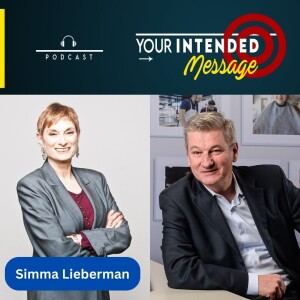
Thursday Dec 28, 2023
Diversity Plus Inclusion: Simma Lieberman
Thursday Dec 28, 2023
Thursday Dec 28, 2023
Diversity and Inclusion are two parts to the formula
How to encourage those that are different to fit in?
Episode 187 (repeat of #32) Simma is based in California
In this conversation with Simma Lieberman we explore:
- The difference between diversity and inclusion
- What it means for people to feel safe, understood and valued
- How to encourage productive and creative workplaces
- The magic formula of "breaking bread" together
- Why we need to start with open conversations
- How leaders can encourage inclusion on their diverse teams
- How to tap into the hidden brilliance of people
About our guest Simma Lieberman:
Simma is known as the "Inclusionlist". She works with organizations to build upon diversity and enhance inclusion to tap into the brilliance of diverse people.
It starts with an open conversation. You can start with the conversation with Simma to learn more about her programs and services at
-----
Excepts from this conversation with Simma Lieberman:
And I look at work cultures in terms of who's in the organization, how do people feel about working in the organization, if they feel included, if they really feel included, or if they're made to feel included, then they feel like they belong.
If they feel like they belong, it means that then they're very comfortable to attributing their best work attributing the genius in the organization, they're willing to take risks, they're willing to stand to be willing to speak up. And when people don't feel included when they feel excluded, they don't feel part of the organization.
And they're more afraid to share their ideas. They don't really see how they fit into the whole organization. They don't have a sense of belonging. And they're just there. And oftentimes, people will leave if people don't feel included in organizations, they don't feel like they're really being valued as an individual, they're gone.
-----
Diversity is all the differences and similarities that people bring to the workplace and the complexities and tensions that go along with that.
You want to have diversity. But oftentimes, when people think diversity, they just think representation of people who look different.
-----
Read the rest of this entry »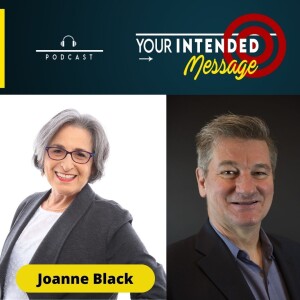
Thursday Dec 21, 2023
Ask and Get More Referrals: Joanne Black
Thursday Dec 21, 2023
Thursday Dec 21, 2023
Get more referrals for your business
If you hate cold calling - listen now!
Episode 186 (repeat of #21) Joanne is based in California
In this conversation with Joanne Black we explore:
- Why referrals can be a lucrative source of new business
- Why you need a repeatable referral getting process
- How to get over the fear of asking for referrals?
- How to stop cold calling and start warm calling
- The magic phrase to ask client to get more referrals
- And much more about referrals...
About our guest Joanne Black:
Joanne is considered to be America's leading authority on referral selling. She is the author of "Pick Up the Damn Phone" and "No More Cold Calling:.
Visit her website https://www.nomorecoldcalling.com/


-----
Excerpts from this conversation with Joanne Black:
Are you asking every one of your clients for referrals?
-----
I added a question on the last round. Would you be willing to be a referral to this company?
-----
Everybody loves referrals, and we just love receiving them. But it's not an outbound proactive, intentional approach. And so what I did is, I said, What do I need to do to close that gap? And make referrals? Not only common sense, but common practice?
And, would you and I developed a very straightforward system to make it happen, because I'm a salesperson. I don't like complicated. So it's simple. It's not easy, because if it were, everyone would be doing it. And referrals are our biggest competitive differentiator, because when we're introduced, we get in, we get in early, we have time to build relationships and make connections. We get the inside track and we hear things no one else does.
That's the power of referral selling.
-----
And therefore a better way to ask the question would be, who are one or two people you know, I should meet? Or who are one or two people in your network? You can introduce me to?
-----
Read the rest of this entry »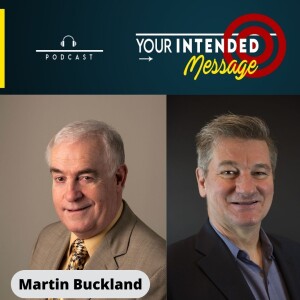
Thursday Dec 14, 2023
Take Control of Your Executive Career: Martin Buckland
Thursday Dec 14, 2023
Thursday Dec 14, 2023
How to package and sell yourself as a desirable product
Why you need to be the brand manager of your career
Episode 185 (repeat of #14) Martin is based in Horseshow Valley, Ontario
In this conversation with Martin Buckland we explore:
- The most common and most damaging resume mistakes
- The pivotal mind shift that career builders need to face
- How to identify your key benefits and sell yourself
- Why accomplishments are far more relevant than responsibilities
- How to tell your STAR stories
- Get your resume past both computer and human screening
- And much more about career transition and building
About our guest Martin Buckland:
As a globally acclaimed Executive Career Coach and Executive Resume Writer, Martin has helped thousands of individuals across the world manage their careers, climb the corporate ladder, and land the job they deserve.
Martin is a Subject Matter Expert in nurturing the careers of EMBA candidates and alumni, ambitious professionals, mining executives, and the C-Suite community in over 74 countries since 1993.
After a distinguished Law Enforcement career, specifically with the renowned London Metropolitan Police and Scotland Yard, Martin retired and started Elite Resumes. Martin provides career management services customized to the client’s job level, sector and career goal.
Learn more about Martin Buckland and his services at the website: https://aneliteresume.com/
Follow or connect with Martin on Linkedin at: https://www.linkedin.com/in/mbuckland/
-----
Excerpts from this conversation with Martin Buckland:
Martin Buckland. What's your personal brand?
I am an expert in helping nurturing coaching senior executives and other business professionals with a lot of ambition to reach their career goals. Now,
I noticed a lot of specific words in there. So you're looking senior senior executives, and you're only looking for ambitious ones you're not looking for you don't want to help the lazy ones. lazy ones can stay away. Exactly. So if they come to you, they right off the bat. They're saying that okay, I'm willing to work at this.
Yeah. So career management is a full time gig. You know, especially when you're in career transition. So you have to work at your career management.
Sadly, people don't they have no idea on career management. So when you're when you're gainfully employed and you should always be managing your career, I don't want to see you disappear off LinkedIn, you don't have to be on LinkedIn as much as you did when you were in career transition.
But once in a while, show me you're there it shows, do some activity, share some content, share a blog, or comment on something, or publish your own blog.
------
Be active on social media. If you avoid social media, I can't find you and you can't find them. On social media. If you haven't got LinkedIn profile, you're committing career suicide, but then not only just having a profile, you need to be active on that profile, you need to fill it in from top to bottom because it's, it's it's scroll, you can scroll all the way down.
So make sure you're active on social media. Convert to the sales mode, which we talked about earlier.
You are selling yourself to the market. And then make sure you have an up to date resume or CV ATS friendly. And then just keep up your network, your network you need to network network network. We're in a network age. If you don't network, that's going to bring that's going to diminish your chances of getting up to the top level.
-----
Read the rest of this entry »